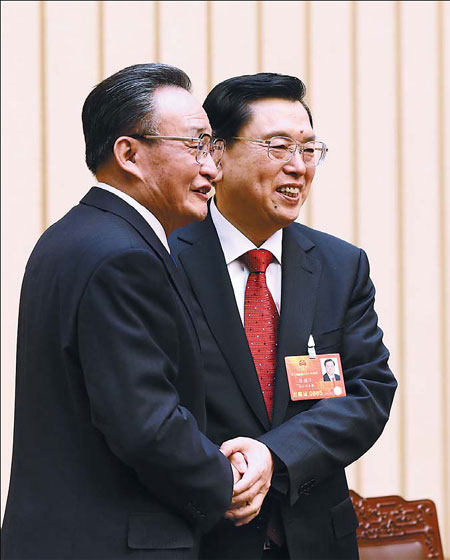Reform will be within 'socialist system'
Updated: 2013-03-05 07:53
By Zhao Yinan (China Daily)
|
||||||||
|
Top leaders Wu Bangguo (left) and Zhang Dejiang shake hands on Monday at the first meeting of the presidium of the first session of the 12th NPC after Zhang was elected executive chairman of the presidium. Wu Zhiyi / China Daily |
Spokeswoman said country has found an appropriate route and it is making headway
China reaffirmed that it will not copy other countries' models in its drive for political reform, a spokeswoman said on Monday.
China's political reform is "the self-improvement and development of the socialist system with Chinese characteristics," said Fu Ying, spokeswoman for the first session of the 12th National People's Congress, which is scheduled to convene on Tuesday.
Experts said the veteran diplomat's comments show the top leadership's stance that political reform is more likely to be carried out by modifying the current socialist system without changing its character.
"It is unfair and inaccurate to say China will go nowhere if it does not copy other countries' models," she said, calling China's reform "comprehensive and systematic".
China has already found a road appropriate for the country and is making headway. Therefore, "we have no reason not to go along this road", the spokeswoman said.
Fu said the second plenary session of the 18th CPC Central Committee held last month put forward many concrete means of reform. China will transform government functions and streamline administration, according to a statement issued after last month's plenary session.
Political reform has constantly made headlines during the two sessions, China's biggest annual political event, as many are counting on a decisive change from the central leadership to shed the institutional obstacles that have held back the second largest economy from greater economic and social success.
However, speculation about reform coming to a deadlock has swirled as experts accuse monopolists, corrupt officials and people with vested interests of deterring reform-minded officials from taking concrete actions.
Wang Yukai, professor at the Chinese Academy of Governance, urged Chinese leaders to spearhead political reform, which he called the "biggest stumbling block on the way toward deeper reform".
"It is not a question about whether we should reform, but how we will accomplish it. A key in pushing forward is to prevent power from being overly concentrated," he said.
Chinese lawmakers will also scrutinize the budget for the social security fund at the upcoming legislative session, Fu said.
It marks the first time lawmakers will read the social security fund budget as part of the central government budget report.
"The social security fund has a bearing on the fundamental interests of the people. We must manage and supervise it well," Fu said.
China has formed a relatively comprehensive framework to review and supervise the government's budget and expenditure at all levels. But there is still room for improvement, Fu said.
The top legislature moved to read the draft amendment to the Budget Law in December in a bid to shore up supervision on government spending. During a monthlong period of public feedback, the controversial draft attracted almost 331,000 comments and suggestions, the second-highest number since the top legislature started to solicit public opinion.
Liu Jianwen, a fiscal law professor at Peking University, said including the social security fund into the budget was started after last year's annual session saw a record low approval rate by national lawmakers when the annual budget report was delivered by the Ministry of Finance.
"The low votes indicate that deputies to the NPC are gradually becoming aware that the budget is a cornerstone of political democracy. The government is responsible to deliver a budget that is easy to understand," he said.
Chen Weilan, former vice-president of the Chinese Academy of Governance who will attend the meeting as an observer, said the issue she is concerned about most is the government budget.
Except for including all the revenues in the government budget, Chen said she also expects the government to reform transfer payments that are allocated by the central government for specific local government projects.
zhaoyinan@chinadaily.com.cn

(China Daily 03/05/2013 page5)

 In Photos: 7.0-magnitude quake hits Sichuan
In Photos: 7.0-magnitude quake hits Sichuan
 Li Na on Time cover, makes influential 100 list
Li Na on Time cover, makes influential 100 list
 FBI releases photos of 2 Boston bombings suspects
FBI releases photos of 2 Boston bombings suspects
 World's wackiest hairstyles
World's wackiest hairstyles
 Sandstorms strike Northwest China
Sandstorms strike Northwest China
 Never-seen photos of Madonna on display
Never-seen photos of Madonna on display
 H7N9 outbreak linked to waterfowl migration
H7N9 outbreak linked to waterfowl migration
 Dozens feared dead in Texas plant blast
Dozens feared dead in Texas plant blast
Most Viewed
Editor's Picks

|

|

|

|

|

|
Today's Top News
Live report: 7.0-magnitude quake hits Sichuan, heavy casualties feared
Boston suspect cornered on boat
Cross-talk artist helps to spread the word
'Green' awareness levels drop in Beijing
Palace Museum spruces up
First couple on Time's list of most influential
H7N9 flu transmission studied
Trading channels 'need to broaden'
US Weekly

|

|








